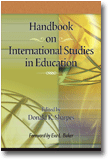
Handbook on International Studies in Education
Edited by:
Donald K. Sharpes, Arizona State University
Published 2010
This Handbook provides windows into worldwide research endeavors, including countries not usually widely known in international education studies. The goal of this compendium is to foster the understanding of research and education from different national and cultural perspectives, and to support the exchange of ideas and people who conduct research and development activities. From these varied individual and collaborative research projects we can infer directions for our own research agenda and for policy development.
The resulting chapters represent a respectable cross-section of international research efforts. The total is representative of the variety of research techniques. Additionally, there are more women than men contributors, with sufficient representation from Muslim, Asian and developing country contributors.
These seventeen chapters are an indication of what is occurring in the global educational marketplace. They represent a sound and current balance of international studies in education that can be used as models for development elsewhere. Reading them can motivate researchers everywhere to maintain a high level of scholarship that will benefit international and comparative studies and the academic profession.
CONTENTS
Foreword, Eva L. Baker. Introduction, Donald K. Sharpes. PART I: METHODOLOGY AND CROSS-CULTURAL RESEARCH. Developing Cross-Cultural Instruments for Cross-National Studies, James Reed Campbell. Current Trends and Dilemmas in Cross-Cultural Research, Kirsi Tirri and James Reed Campbell. PART II: REGIONAL AND NATIONAL STUDIES. Effective Schools in Arab Educational Systems: A Multi-Level Approach Using TIMSS 2003 Data, Oliver Neuschmidt, Juliane Hencke, Leslie Rutkowski, and David Rutkowski. Internationalizing the Training of K–12 Teachers Findings from Research on Undergraduate Teacher Education Programs, Ann Schneider. PART III: THE MIDDLE EAST. Schooling of Young Adolescents in Lebanon, Karma El Hassan. Cognitive Abilities of United Arab Emirates Female Education Students, Donald K. Sharpes. PART IV: AFRICA. Visions and Challenges for Teacher Education in Eritrea: A Personal Account, Kirsten Borberg. Education-Occupation Mismatch and the Effect on Wages of Egyptian Workers, Fatma El-Hamidi. PART V: EUROPE. Teacher Attitudes Toward Muslim Student Integration into Civil Society, Donald K. Sharpes, Lotte Rahbek Schou, Iouri Zagoumennov, Geir Karlsen, Ove Haugalokken, and Stefan Hopmann. Partnership Between a Faculty and Schools for Encouraging the Teacher as Researcher: A Case Study from Slovenia, Majda Cenic. International Cooperation for Educational Innovations in Belarus, Iouri Zagoumennov. Danish Teacher Attitudes towards National Student Testing Comparison between NCLB and Danish National Testing Standards, Lotte Rahbek Schou. Education Studies in Spain: Insights, Issues, and Failures, Juana M. Sancho and Fernando Hernández. PART VI: ASIA. The Current State of Affairs in Japanese Education: Schooling in Flux, Julia Christmas Nishibata. Phoenix and Dragon: Examining Parental Expectations of Only Child Girls and Only Child Boys in Urban China, Yandong Liang, Yukari Okamoto, and Mary E. Brenner. PART VII: INTERNATIONAL INITIATIVES. A Brief History of Federal International Initiatives, Donald K. Sharpes. Adolescent Self-Concept among Chinese, Kazahks, and Americans, Donald K. Sharpes. About the Contributors.
REVIEWS
"In the Handbook on international studies in education, Donald Sharpes has edited a collection of papers organised to provide to emerging scholars of International Studies a sense of how they might approach their research. The essays demonstrate a variety of national and cultural perspectives on such research and are loosely arranged so as not to project any particular research agenda. To a casual reader, such an arrangement might prove slightly disconcerting at first. In the long view, however, the lack of agenda is refreshing and each paper provides subtle differences in approach from the detailed and formulaic to the broad overview designed to provide a context for policy changes." Michael McVey Eastern Michigan University in International Review of Education
-
Paperback978-1-60752-383-3
Web price: $45.04 (Reg. 52.99)
-
Hardcover978-1-60752-384-0
Web price: $80.74 (Reg. 94.99)
- eBook9781607523857

-
 (Re)Envisioning Social Studies Education Research
Current Epistemological and Methodological Expansions, Deconstructions, and Creations
(Re)Envisioning Social Studies Education Research
Current Epistemological and Methodological Expansions, Deconstructions, and Creations
-
 Affirming Identity, Advancing Belonging, and Amplifying Voice in Sororities and Fraternities
Affirming Identity, Advancing Belonging, and Amplifying Voice in Sororities and Fraternities
-
 Effective Alternative Assessment Practices in Higher Education
Effective Alternative Assessment Practices in Higher Education
-
 Expanding the Vision of Faculty Learning Communities in Higher Education
Emerging Opportunities for Faculty to Engage Each Other in Learning, Teaching, and Support
Expanding the Vision of Faculty Learning Communities in Higher Education
Emerging Opportunities for Faculty to Engage Each Other in Learning, Teaching, and Support
-
 Institutional Diversity in American Postsecondary Education
Institutional Diversity in American Postsecondary Education
-
 Promoting Equitable Classroom Practices in Higher Education
Approaches Beyond Curriculum
Promoting Equitable Classroom Practices in Higher Education
Approaches Beyond Curriculum
-
 The Handbook for Aspiring Higher Education Leaders
The Handbook for Aspiring Higher Education Leaders

